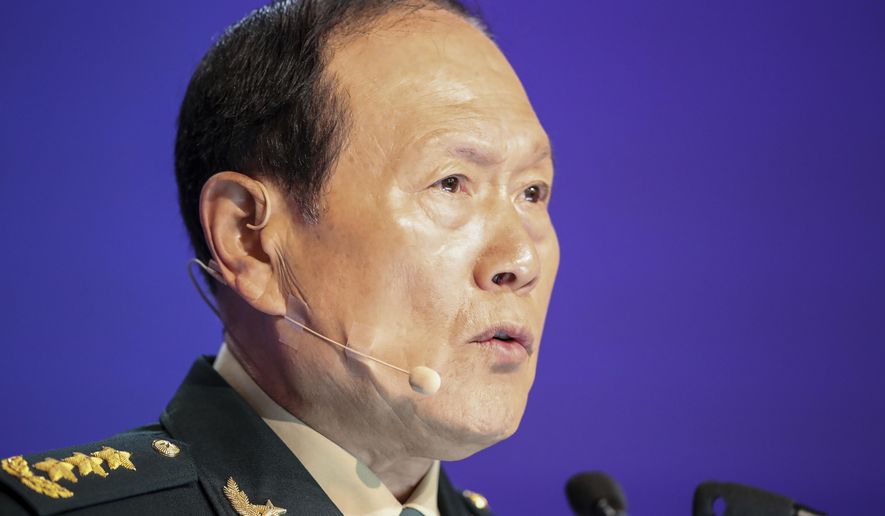The U.S. is to blame for rising tensions in the Pacific, and America’s Indo-Pacific strategy will only further divide the region and ultimately is “doomed to failure,” a Chinese military official said Sunday.
The sharp comments from Chinese Lt. Gen. Zhang Zhenzhong came just hours after U.S. Defense Secretary Lloyd Austin spoke at the high-level Shari-La Dialogue in Singapore and blasted China’s “provocative and destabilizing military activity near Taiwan.” The normally reserved Mr. Austin delivered a stinging rebuke of China’s rapidly growing military footprint throughout the Pacific, specifically its recent military aircraft flyovers near Taiwan.
Those Chinese actions and others, Mr. Austin said, have led to higher tensions in the region. He pledged that the U.S. would help maintain “peace and stability” in the Pacific and would continue to provide aid to Taiwan’s defense forces.
But Gen. Zhang defended his military’s posture in the Pacific and said the U.S. is wading into dangerous territory by playing the “Taiwan card” at every opportunity.
“The Taiwan question is the one question that could most easily lead the China-U.S. relations into conflict. Mishandling of the Taiwan question will have a destructive impact on bilateral ties. The People’s Liberation Army always stands ready to resolutely safeguard national sovereignty, security and territorial integrity at any cost,” said Gen. Zhang, deputy chief of the joint staff department at China’s Central Military Commission.
“The U.S. Indo-Pacific strategy is a strategy that goes against historical trends and prevailing will of regional countries. It only serves the U.S. own interests and therefore is doomed to failure,” Gen. Zhang said, according to the media outlet China Daily.
“The United States is the biggest source of instability in international order, the backstage manipulator for global turmoil and a dangerous threat to regional peace and stability,” he said.
His comments echoed those of Defense Minister Gen. Wei Fenghe, who suggested the U.S. strategy was an attempt to back China into a corner.
“No country should impose its will on others or bully others under the guise of multilateralism,” he said. “ The strategy is an attempt to build an exclusive small group in the name of a free and open Indo-Pacific to hijack countries in our region and target one specific country — it is a strategy to create conflict and confrontation to contain and encircle others.”
Last year U.S. officials accused China of testing a hypersonic missile, a weapon harder for missile defense systems to counter, but China insisted it had been a “routine test of a spacecraft.”
Answering a question about the test on Sunday, Gen. Wei came the closest so far to acknowledging it was, indeed, a hypersonic missile, saying, “As for hypersonic weapons, many countries are developing weapons and I think there’s no surprise that China is doing so.”
“China will develop its military,” he added. “I think it’s natural.”
He said China’s “greatest wish” was “peaceful reunification” with Taiwan, but also made clear Beijing was willing to do whatever it took to realize its goals.
“China will definitely realize its reunification,” he said. “China’s reunification is a great cause of the Chinese nation, and it is a historical trend that no one and no force can stop.”
Gen. Wei and Mr. Austin met one-on-one on Saturday, and Taiwan featured prominently in their discussions, according to U.S. officials.
— This article includes wire service reports.
• Ben Wolfgang can be reached at bwolfgang@washingtontimes.com.




Please read our comment policy before commenting.